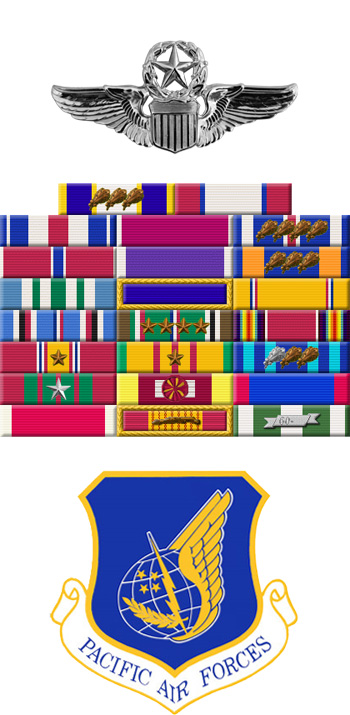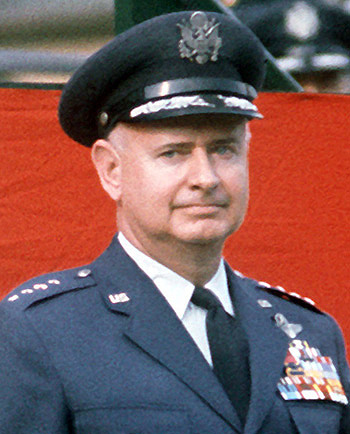
|
John W. Vogt, Jr. |
 |
|||
| Rank, Service | ||||
General O-10, U.S. Air Force |
||||
| Veteran of: | ||||
|
||||
| Tribute: | ||||
John Vogt was born on March 18, 1920, in Elizabeth, New Jersey. He enlisted in the Aviation Cadet Program of the U.S. Army Air Forces on September 2, 1941, and was commissioned a 2d Lt and awarded his pilot wings at Ellington Field, Texas, on April 29, 1942. Lt Vogt was then assigned to the 63rd Fighter Squadron of the 56th Fighter Group, deploying with the group to England in January 1943, where he flew the P-47 Thunderbolt. Vogt was credited with the destruction of 5 enemy aircraft in aerial combat plus 1 damaged before becoming commander of the 360th Fighter Squadron of the 356th Fighter Group in February 1944. Maj Vogt destroyed 3 more enemy aircraft in the air, for a total of 8 destroyed and 1 damaged, before returning to the U.S. in October 1944. He was commander of Ibura Army Base in Recife, Brazil, from June to November 1945, and he then left active duty and went into the Air Force Reserve on November 10, 1945. John then attended Yale University, going back on active duty beginning July 17, 1946, and graduating with a bachelor's degree in International Relations in 1947. He then served as an Intel Staff Officer before receiving his Masters Degree in International Relations from Columbia University in 1951. Col Vogt then served in the Office of the Special Assistant to the Joint Chiefs of Staff for National Security Council Affairs from February 1951 to August 1955, followed by service as Assistant Deputy for Plans and Operations with Headquarters Far East Air Forces, Japan, from August 1955 to October 1956. He was Special Assistant to the Chief of Staff of Pacific Air Forces at Hickam AFB, Hawaii, from October 1956 to August 1958, and then received an Air Force Institute of Technology assignment to Harvard University from August 1958 to July 1959. Col Vogt next served with Headquarters U.S. Air Force in the Pentagon, from July 1959 to August 1965, and then returned to Hickam AFB as Deputy Chief of Staff for Plans & Operations at Headquarters Pacific Air Forces from August 1965 to June 1968. Gen Vogt then returned to the Pentagon, where he served on the Joint Staff until April 1972, followed by service as commander of 7th Air Force and deputy commander of the U.S. Military Assistance Command Vietnam in Siagon, Republic of Vietnam, from April 1972 to August 1973. Gen Vogt was commander in chief of Pacific Air Forces at Hickam AFB from October 1973 to June 1974, and then commander in chief of U.S. Air Forces in Europe and commander of Allied Air Forces Central Europe at Ramstein AB, West Germany, from June 1974 until his retirement from the Air Force on August 31, 1975. Gen Vogt is the only person ever to have commanded both USAFE and PACAF. John Vogt died on April 16, 2010. |
||||
|
||||

